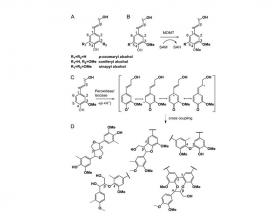Technologies Available for License
Categories: biotechnology & healthenvironment
2008-026 and 2013-029: Modification of Lignin Content of Plant Cell Walls
Invention: 2008-026
Patent Status: U.S. Patent Number 8,889,392 was issued on November 18, 2014
For technical and licensing related questions, email tcp@bnl.gov.
Summary

The scheme of lignin polymerization process and MOMT-catalyzed reaction. A, lignin monomeric precursors. B, MOMT-catalyzed methylation reaction. C, the dehydrogenation of monolignols. D, the subsequent polymerization process.
Lignin, the most abundant terrestrial biopolymer after cellulose, imparts structural integrity to the plant cell wall. However, its presence hinders the degradability of feedstock in biofuel production, lowers the biomass conversion efficiency. Rational manipulation of lignin composition, polymerization, and regulation provide new opportunities for producing liquid biofuel using bioenergy crops as feedstock. Para-hydroxyls (i.e., 4-OH) of phenolics are critically important for oxidative coupling of phenoxy radicals to form lignin polymer (Fig.). Studies have shown the 4-O-methoxylation of monolignol, the lignin precursor, efficiently impairs oxidative radical coupling in vitro. Thus, transgenic energy crops with an engineered enzyme that enables the methylation of the para-hydroxyls of monolignols can lead to altered polymerization of lignin making the biomass easier to process for biofuels. Researchers at Brookhaven have developed transgenic poplar plants expressing novel monolignol 4-O-methyltransferases whose biomass is easier to process for biofuels.
Description
Scientists at Brookhaven have generated a set of novel enzymes, namely monolignol 4-O-methyltransferases (MOMTs) that are able to chemically modify lignin precursors to effectively prevent their incorporation and subsequent polymerization into lignin (Scheme). These novel enzymes generated were expressed in the model experimental plant Arabidopsis, and in poplar, the energy crop (Fig. 2). In both cases, expression of MOMT resulted in 16~24% reduction in its total lignin content. Researchers found that the wood biomass from the transgenic poplars showed 50~80% less S-type lignin subunits; meanwhile, the cellulose content in the transgenic cell walls increased by ~12%. The compositional and structural changes in the cell wall resulted in 62% increase of the saccharification efficiency, release of simple sugar after cellulase treatment of biomass from transgenic poplars grown in a greenhouse or in the field study, compared to the biomass from the wild-type control poplars treated under the same treatment condition. The green house and field study data suggest that the transgenic poplars expressing the novel MOMT created at Brookhaven represent a promising advanced feedstock for generating biofuels and/or other bio-products.
Benefits
The biomass with altered lignin content from engineered transgenic crops with these novel MOMTs, will have greater digestibility for biofuel production and to potentially produce other industrially relevant biochemicals.
Applications and Industries
The re-direction of lignin biosynthesis pathway may be used to produce transgenic plants having more digestible biomass for biofuel and production of useful chemicals.
Journal Publication & Intellectual Property
- Enhancing digestibility and ethanol yield of Populus wood via expression of an engineered monolignol 4-O-methyltransferase (.pdf)
- Tailoring lignin biosynthesis for efficient and sustainable biofuel production (.pdf)
- An Engineered Monolignol 4-O-Methyltransferase Depresses Lignin Biosynthesis and Confers Novel Metabolic Capability in ArabidopsisC (.pdf)
- Engineering Monolignol 4-O-Methyltransferases to Modulate Lignin Biosynthesis (.pdf)
- Engineering a Monolignol 4-O-Methyltransferase with High Selectivity for the Condensed Lignin Precursor Coniferyl Alcohol (.pdf)
- US 8,889,392 B2 (.pdf)
- US 9,556,420 B2 (.pdf)
- Simultaneous suppression of lignin, tricin and wall-bound phenolic biosynthesis via the expression of monolignol 4- O-methyltransferases in rice (.pdf)
Press Releases
Contacts
-

Poornima Upadhya
Manager Technology Transfer & Commercialization
Technology Commercialization
(631) 344-4711, pupadhya@bnl.gov
-

Avijit Sen
IP Licensing & Commercialization
Technology Commercialization
(631) 344-3752, asen@bnl.gov




